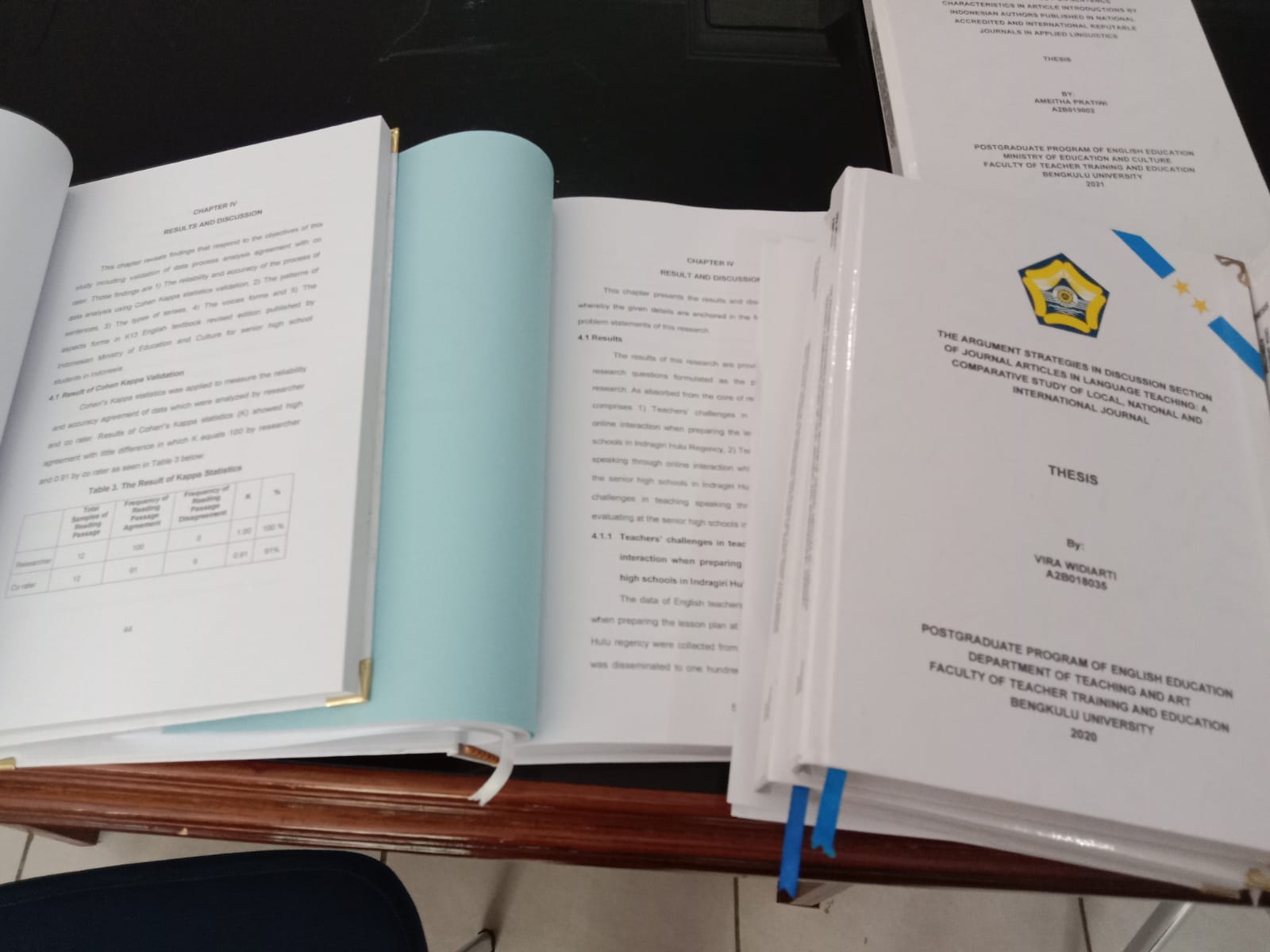Students’ rhetorical structure mastery of the finding and discussion section in English thesis
DOI:
https://doi.org/10.21070/jees.v7i1.1643Keywords:
Rhetorical structure, Finding, Discussion section, DifficultyAbstract
This study aimed to determine the rhetorical structure of the finding and discussion chapters on the thesis and their problems. This study applied a mixed method. The sample of this research was 30 parts of the finding and discussion of the theses of Bengkulu University English Education postgraduate students who graduated from 2019 to 2020. This study used a checklist as a research instrument. The data obtained were analyzed qualitatively by applying several stages such as data reduction, data presentation and drawing conclusions, while quantitative data were obtained through SPSS. The results indicated that students' mastery of rhetorical structures, especially in the finding and discussion section, is categorized as high and medium, where in the finding section, the average value of students was 41 which is categorized as high, while the average value in the discussion section is 37 which is included in the medium category. The next finding was that some students had difficulty in writing the finding and discussion chapters. These problems included analyzing data, interpreting data, writing discussion sections, incomplete rhetorical structures in writing, mastery of English including vocabulary and grammar, writing the evaluation section in the discussion, coherence and cohesiveness in writing and personal problems.
HIGHLIGHTS :
- Rhetorical structure mastery in Findings of Thesis was categorized as high.
- Rhetorical structure mastery in Discussion of Thesis was categorized as medium.
- Several students faced challenges in mastering rhetorical structure of findings and discussion,
especially interpretation, rhetorical structure, and discussion of findings.
Downloads
References
Amalia, S. Kadarisman, E., Laksmi, E.D. (2018). The rhetorical moves in Indonesian EFL thesis abstracts across educational levels. Jurnal Pendidikan Humaniora. 6(2), 99-107.
Amnuai, W., & Wannaruk, A. (2013). A move-based analysis of the conclusion sections of research article published in international and Thai journals. 3L: Language, Linguistics, Literature, 19(2), 53-63.
Arizavi, S., Shokouhi, H., Mousavi, S.A. (2013). Cross-disciplinary analysis of rhetorical structure of dissertation abstracts. The Iranian EFL Journal. 2(1), 81-400.
Arsyad, S. (2013a). A genre-based analysis of Indonesian research articles in the social sciences and humanities written by Indonesian speakers. Journal of Multicultural Discourses, 8(3), 234-254.
Ary, D., Jacobs, L. C., Sorensen, C. K., Walker, D. A., & Razavieh, A. (2010). Introduction to research in education. In Measurement (8th ed., Vol. 4, Issue 43). Wadsworth, Cengage Learning. https://doi.org/10.1017/CBO9781107415324.004
Creswell, J. W.(2014). Research Design: Qualitative, Quantitative and Mixed Method Approaches 4th Edition. New York: SAGE Publication Inc.
Dastjerdi, Z.S., Tan, H., Abdullah, A.N. (2017). Rhetorical structure of integrated results and discussion chapter in master’s dissertations across disciplines. Discourse and Interaction. 10(2), 61-83.
Doro, K. (2013). The rhetoric structure of research article abstracts in English studies journals. Prague Journal of English Studies, 2(1), 119-139.
Emilia, E. (2010). Menulis tesis dan disertasi. Bandung: Alfabeta.
Indrian, R.D., & Ardi, P. (2019). Rhetorical structures of English-major undergraduate thesis introduction chapters. Indonesian Journal of EFL and Linguistics, 4(2), 195-214.
Kawase, T. (2018). Rhetorical structure of the introductions of applied linguistics PhD theses. Journal of English for Academic Purposes. 31(3), 18-27.
Loan, N.T.T., & Sook, I.P. (2014). Rhetorical structure of introduction chapters written by novice Vietnamese TESOL postgraduates. 3L: The Southeast Asian Journal of English Language Studies, 20 (1), 61 –74.
Loan, N.T.T. (2018). Rhetorical Structures and Linguistic Features of English Abstracts in Thai Rajabhat University Journals. 3L: The Southeast Asian Journal of English Language Studies, 24(4), 71 – 84.
Miles, M.B., Huberman ,A.M., & Saldana,J. (2014). Qualitative data analysis: A. methods sourcebook, Edition 3. USA: Sage Publications.
Moghadam, A.Z., & Meihami, H. (2016). A rhetorical move analysis of TEFL thesis abstracts: The Case of Allameh Tabataba’i University. Issues in Language Teaching (ILT), 5(1), 1-23.
Morales, O.A., Perdomo, B., Cassany, D., Ixarra, E. (2020). The rhetorical structure of theses and dissertations in dentistry: A study in Hispano-America and Spain. Íkala, Revista de Lenguaje y Cultura. 25(2), 373-393.
Nimehchisalem, V., Tarvirdizadeh, Z., Paidary, S.S., Hussin, N.I.S.B.M. (2016). Rhetorical moves in problem statement section of Iranian efl postgraduate students' theses. Advances in Language and Literary Studies. 7(4), 173-180.
Noorli, K. (2011). A Lexical Investigation of Engineering English: A Corpus-Based Approach. Unpublished dissertation, Universiti Teknikal Malaysia Melaka, UTEM.
Parnawati, T.A., Basthomi, Y., Ruslan, S. (2017). Rhetorical moves in the introductions of Islam-related research articles. Jurnal Pendidikan Humaniora. 5(4), 169-174.
Pujiyanti, I.A., Arsyad, S., & Arono. (2018). Rhetorical structure analysis on introduction chapters of English master theses by Indonesian postgraduate students. IJEE (Indonesian Journal of English Education). 5(2), 143-164. doi:10.15408/ijee.v5i2.8423.
Renandya, W. A., & Widodo, H. P. (Eds.). (2016). English language & teaching today: Linking theory and practice (Vol. 5). Springer.
Siyaswati., & Rochmawati, D. (2017). Rhetorical perspectives of undergraduate students’ theses abstracts. Register Journal, 10(2), 157-169.
Solihatul, U. (2019). The Rhetorical Moves in the thesis background of English language education department students at Uin Sunan Ampel. Unpublished Thesis. UIN Sunan Ampel. Surabaya.
Supatranont, P. (2012). Developing a writing template of research article abstracts: A corpus-based method. Procedia - Social and Behavioral Sciences, 66, 144-156.
Suryani, I., Kamaruddin, H., Hashima, N., Yacoob, A., Rashid, S.A., Desa, H. (2014). Rhetorical structures in academic research writing by non- native writers. International Journal of Higher Education, 3(1), 30-38.
Swales, J.M. (2004). Research Genres: Explorations and Applications. Cambridge: Cambridge University Press.
________ (1990). Genre Analysis: English in Academic and Research Settings. Cambridge: Cambridge University Press.
Wasito., Arsyad, S., & Harahap, A. (2017). Stating and defending new knowledge claim: A rhetorical Analysis on the discussion section of English master thesis by Indonesian EFL learners. IJEE (Indonesian Journal of English Education). 4(2), 188-207.

Published
How to Cite
Issue
Section
License
Copyright (c) 2022 Syafryadin Syafryadin, Alamsyah Harahap, Annisa Astrid, Imam Sudarmaji

This work is licensed under a Creative Commons Attribution 4.0 International License.







